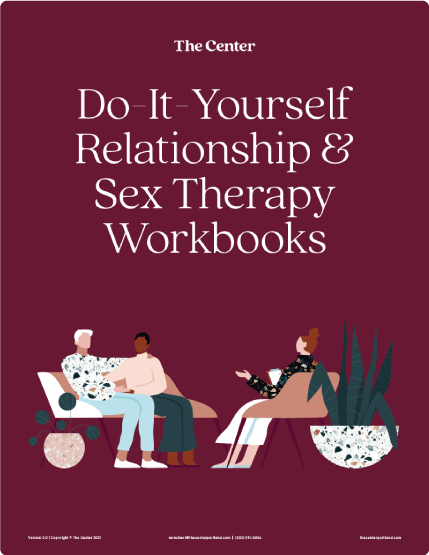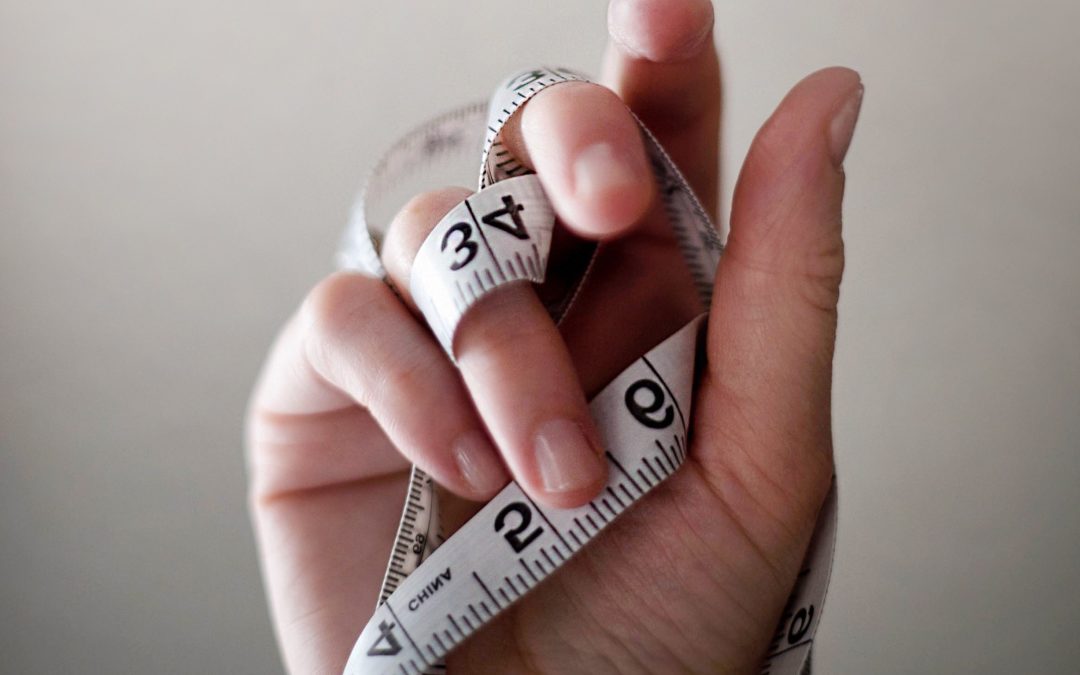Sexual performance anxiety. We’ve all felt it, but none of us want to talk about it. Can’t we just pretend like it’s not a thing and move on with our mediocre sex lives?!
If you’re like most of the couples I’ve worked with, you’re very familiar with this common conundrum. Your relationship seems to be doing fine. You love each other, you communicate as well as any other couple you know, and you both want a fulfilling sex life. On the surface, it seems like sex should be stress-free and easy-peasy for you and your partner. But between the sheets, it’s anything but stress-free and easy-peasy. You can’t quite put your finger on why, but the truth is, performance anxiety is making it damn near impossible to achieve the erotic passion you’re trying to create.
Ugh! Why is this happening?! What I’m envisioning is not lining up with how my body is responding. Things aren’t working, I’m distracted, I’m stressed out, and our sexual satisfaction is suffering. Sound familiar?
Sexual performance anxiety is the silent killer of good sex in long-term relationships.
You know how Superman loses all of his powers when he’s exposed to kryptonite? Sexual performance anxiety is kind of like that. As soon as performance pressure sneaks into your brain space, your sexual energy shrivels up and hides somewhere in the deep, dark trenches of your anxiety and self-criticism.
The fact is, we cannot be relaxed and present during sex if we’re feeling performance anxiety… and relaxation and presence are the keys to the kingdom of sexual satisfaction.
The Two-Step Plan to Overcome Performance Anxiety in the Bedroom
Part 1: Do I have sexual performance anxiety?
Here are some common thoughts that accompany sexual performance anxiety:
- Will my erection last?
- Am I going to orgasm?
- Why is this so painful?
- I should be more aroused right now.
- I don’t think my partner is enjoying this… wait, I don’t think I’m enjoying this!
Inevitably, these seeds of self-doubt take root and blossom into internalized shame and self-criticism that might sound something like this:
- What’s wrong with you?
- You’re so unattractive.
- Real men can keep erections, why can’t you?
- I’m never going to be able to orgasm because I’m broken.
- I hate myself.
See what I mean about sexual performance anxiety being the silent killer?
These thoughts sneak in and destroy our ability to have good sex. We don’t tell our partners that we’re feeling performance anxiety, shame, and self-criticism, because who wants to talk about how shitty they feel? But when we don’t communicate about where we’re getting stuck and what is not working for us, we get stuck in a self-perpetuating loop of bad sex.
Now that you’ve named your sexual problem as performance anxiety, let’s understand why this is happening to you and what you can do to get out of this negative cycle.
Part 2: Why do I feel sexual performance anxiety?
We live in a society that inundates us with messages about how sex should be.
Think about the last sex scene you saw on the big screen. Was there a lot of communication about sex? Did they spend at least thirty minutes on foreplay? Was intercourse a bit awkward at first? NO! It was probably hot and heavy, moving quickly from electric eye contact from across the room to full on penetration with hardly anything in between. Then they orgasm at the same time and collapse on the bed in mutual satisfaction. I know it’s super hot, but I’ve got to call bullshit on this sexy narrative. This is not how it works for most couples in the real world.
(Disclaimer: I’m not saying that sex with a long-term partner can never be like this. It totally can! But don’t expect that kind of sex on the regular. You’ve got to learn how to have good, boring sex before you can communicate well enough to spice things up. More on that later!)
This faulty narrative messes with our heads in two ways:
- We internalize unrealistic expectations about sex.
- We learn that sex is about performance and orgasm, not about creating closeness and intimacy.
Herein lies our challenge!
We need to shift our intention away from unrealistic sexual performance and towards realistic emotional connection.
The marker of success shouldn’t be whether or not we orgasm simultaneously, how long I can maintain my erection, or how adept I am at giving my partner pleasure. Those are all performance variables. This creates the belief that my sexual satisfaction is tied to my sexual performance. This doesn’t work in the long run because we can’t perform with high marks all of the time. It’s impossible! When we’re measuring ourselves against the impossible, it makes sense that we develop self-criticism, shame, and sexual performance anxiety!
But when we’re focusing on emotional connection, it doesn’t matter what happens during sex! Things might work splendidly or our bodies may not cooperate at all. The goal is to share physical touch in a way that feels pleasurable and helps us to connect emotionally. Orgasm may or may not happen, but emotional closeness is guaranteed. Doesn’t that sound wonderful?
Part 3: How can I exchange my sexual performance anxiety for a mutually satisfying and emotionally connecting physical relationship?
Here is my two-step plan to help you and your partner transition away from performance anxiety and towards shared emotional intimacy and pleasure:
Step #1: Learn about the different types of touch you can share during physical intimacy and practice communicating openly about what you need to stay relaxed and present in the moment.
Barry McCarthy, a well-known sex therapist and researcher, crafted my favorite description of the different types of touch you can share with your partner. He uses the analogy of gears to describe five different dimensions of touch. I’m going to describe it briefly, but for more tips from Barry check out his book for couples by clicking here.
The Five “Gears” of Touch
- First Gear: Affectionate Touch — Clothes-on, non-sexual touching, such as holding hands, hugging, and light kissing. This touch provides the foundation for physical intimacy.
- Second Gear: Sensual Touch — This touch brings you deeper into your body and enhances awareness of physical sensations without involving any sexual body parts. For example, a slow, sensual back or foot massage or taking a hot shower together with the intention to touch every part of each other’s bodies except the genitals. This isn’t about sexual arousal or orgasm, this is about feeling pleasurable feelings in your bodies. This is the gear most couples skip in the pursuit of perfect sexual performance.
- Third Gear: Playful Touch — This is a combination of Second Gear and Fourth Gear. You are transitioning from sensual to erotic. Think playful teasing and sexy unpredictability. Things are starting to heat up here!
- Fourth Gear: Erotic Touch — This touch is intended to heighten sexual arousal and does involve touching sexual body parts. It may result in orgasm or it may lead organically to intercourse.
- Fifth Gear: Intercourse — This is an organic culmination of the first four gears of touch. You don’t have to have intercourse for the experience to be successful. It’s not a pass-fail test! It’s simply another option on the sexy menu.
Most couples alternate between First Gear (non-sexual touch) and Fifth Gear (intercourse), skipping all of the gears in between! This is a sure-fire way to experience performance anxiety. We need to expand our options so that there are more opportunities for success.
I encourage all of my couples to practice touch in each of the five distinct dimensions.
This requires clear communication and ongoing check-ins about how you’re feeling during the physical experience.
If you start to feel sexual performance anxiety, tell your partner that you need to downshift to a lower-intensity gear.
For example, if you’re playing around in Third Gear and start to feel anxious about being able to maintain your erection or reach orgasm, tell your partner you need to downshift back to Second Gear until you’re feeling more relaxed and confident.
Clear communication and flexibility during physical intimacy makes it nearly impossible to get stuck in anxiety because you’re constantly adapting to what you need in the moment instead of what you should be doing.
If you practice this technique regularly, you will notice your sexual performance anxiety beginning to dissipate and your emotional connection beginning to flourish.
Step #2: Remember to privilege emotional closeness over sexual performance.
Again, the goal of physical intimacy isn’t to reach orgasm or to progress through all five dimensions of touch. The goal is to maintain your emotional connection while sharing physical pleasure (which may be affectionate, sensual, or erotic).
We all want to orgasm (because it’s awesome), but sometimes it’s not going to happen! We can have a wonderfully satisfying and pleasurable experience without engaging in erotic touch or intercourse. If we allow ourselves to privilege emotional connection over sexual performance and orgasm, we end up feeling less anxiety and more pleasure. It’s literally a win-win scenario!
Here’s the recap:
- Identify if you suffer from sexual performance anxiety
- Understand why you might be struggling with performance anxiety
- Practice strategies to help you and your partner develop a physical relationship that creates emotional closeness and physical pleasure – a win-win solution!






